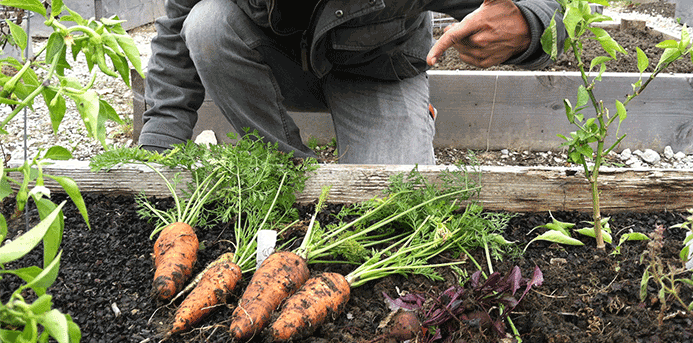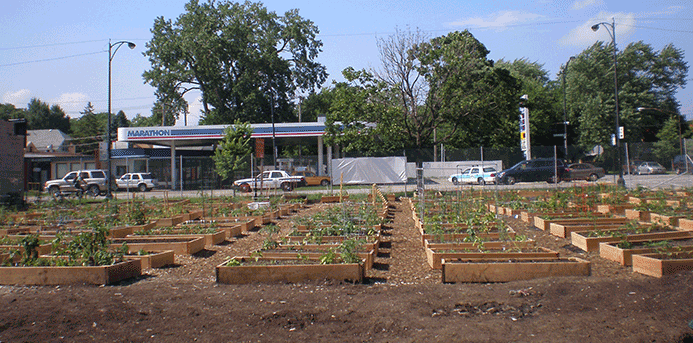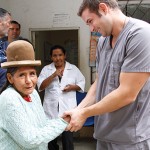As we all become more aware of what we eat and the origin of our food, vegetable gardening is booming. Leading the way is LaManda Joy, founder of the Peterson Garden Project, an award-winning not-for-profit, that has brought community, urban gardening to Chicago in a big way. Built mostly on idle lots throughout the city, Peterson Garden Project is a place where Joy and her team teach thousands of new gardeners to grow, cook and eat organically grown food.
Putting Passion to Work
Joy grew up in Oregon, and says her dad taught her to garden. “I always enjoyed gardening and found lots of other like-minded friends at the University of Oregon,” she says. “I was working on an idea for a seed company, but ended up moving to Chicago, and working in the corporate world.”
Joy turned her small backyard into a “yarden,” a beautiful, edible garden packed with plants. This passion for gardening and the desire to do something more meaningful led her to eventually leave corporate life and found the Peterson Garden Project in 2010.
“It ended up being the largest organic food garden in the city,” Joy says. “Going on our sixth year now, we have eight gardens, almost 4,000 gardeners and over 1,000 volunteer community members who make the project run. We just opened a community cooking school.”
Learning From the Past
During WWII, with most men at war and little food production, so-called “victory gardens” were created to feed families and communities, with women playing a huge role as gardeners.
“Chicago led the nation in the victory garden movement,” Joy says. “Ninety percent of those involved had never gardened before. The city did a great job teaching the masses how to grow food.”
Joy’s parents lived through the war. Her mom was a Rosie the Riveter and her dad served in the Occupied Forces. “When I realized the lot at Peterson and Campbell was an original victory garden, it sparked the idea that we could do what the victory garden organizers had done over 70 years before – teach the city to grow its own food.”
Getting Involved
Peterson Garden Project’s mission is to recruit, educate and inspire a new generation of gardeners who want to gain control of their food supply, grow their own produce organically and make urban gardening the norm, rather than the exception. “Grewbies” (a new gardener) join one of the community gardens like Ashlandia, Vedgewater, Hello Howard or Land of Lincoln. Garden plots are reserved early in the year, with waiting lists developing from the overflow demand. Members pay $75 for classes, a 4 x 8 plot and some supplies. Beginning in April, they learn how to plant, nourish, prune, harvest, and even cook their healthy food through classes, books and instructional videos. Gardeners develop a strong sense of community as they share their knowledge and their food.
Anticipating the Garlic
Chicagoan Anne Wiley is currently planning her sixth garden through the Peterson Garden Project. She says she had some experience with herbs and perennials when she first joined, but over the years she has learned about proper plant spacing, soil amendments, garden pests and proper watering techniques. Some of the things she loves about tending to her garden is the peacefulness in the early morning or late evening, reconnecting with her garden friends and eating that first sun-ripened tomato of the season.
“However, the very best part of membership is being a part of the larger PGP community. What a great group of people!” Wiley says. “I simply cannot wait to get back into the garden this year. I planted garlic last fall and it’s with great anticipation that I look forward to checking my plot in late April to see the new growth.”
Making It Better for All
Five percent of the garden harvest from each site is donated to local food pantries and nutrition programs through the volunteer-run initiative Grow2Give. Ten percent of the plots at each garden are reserved for scholarship gardeners–individuals or families that cannot afford to participate without assistance. Last year the Peterson Garden Project donated over 2,000 pounds of food.
Cooking the Harvest
“We learned early on that if you’re going to teach people to grow their own food, they also need to know how to cook it,” Joy says. In 2014, Peterson Garden Project opened the Fearless Food Kitchen, a community cooking school focused on beginners.
“The instructors are community members and professional chefs and most of the classes are hands on,” Joy says. “We want people leaving with a lifelong skill, just like in the gardens.”
Feeling Inspired?
If you’d like to step up your garden game, Peterson Garden Project offers a number of resources. Check out Joy’s books and videos, register for a class, or plan to reserve a garden plot in 2016:
- “Fearless Food Gardening in Chicagoland: A Month-by-month Growing Guide for Beginners”
- “Start a Community Food Garden: The Essential Handbook” (selected as one of the “Top 10 Lifestyle Books” of 2014 by Publisher’s Weekly)
- The Garden Minute videos offer simple and quick advice on nearly every topic from planting seed to dealing with weeds to harvesting
- Classes at PGP: Check out the extensive class offerings like Square-Foot Gardening, or learn to cook Plant-Powered Meals
- Volunteer at the PGP by tending a Grow2Give plot, leading tours or teaching gardening skills
- Meet Joy in person on May 2 at Eileen Fisher in Highland Park. She will be doing a book signing for “Start a Community Food Garden: The Essential Handbook.” Ten Percent of the proceeds go to the Peterson Garden Project.
- Joy offers this simple advice for first-time gardeners: “Think of what you like to eat and start there. Easy veggies to get off to a positive start are beans, radishes and chard. They’re kind of foolproof. But, of course, everyone wants tomatoes, which are also relatively easy to grow.”
If you like this, you might also like:
Do Green Gardening




